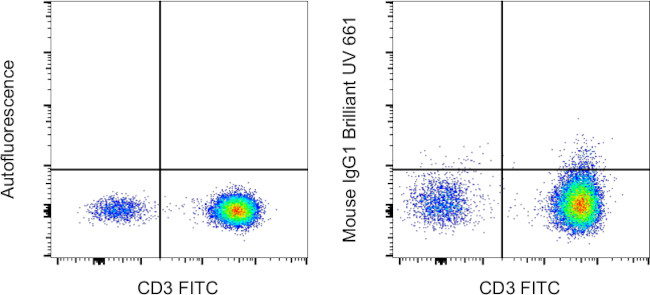Search Thermo Fisher Scientific
Invitrogen
Mouse IgG1 kappa Isotype Control (P3.6.2.8.1), Brilliant Ultra Violet™ 661, eBioscience™
Promotions
View available promotion(s)
Promo Code: P5906365 Don't miss out: buy 3, only pay for 2 Extended to June 27: take advantage of our 3 for 2 promotion. Whether you are restocking essentials or trying something new, now is a great time to get more for your money!. Learn more
Promo Code: RPUZZ25 Stock up on essentials to piece your discovery together Until June 27, save up to $650 and get an exclusive lab-themed hidden-object puzzle. Learn more
FIGURE: 1 / 1
Mouse IgG1 kappa Isotype Control (376-4714-81) in Flow

Product Details
376-4714-81
Flow Cytometry (Flow)
Control (Ctrl)
Host/Isotype
Class
Type
Clone
Conjugate
Excitation/Emission Max
Form
Concentration
Purification
Storage buffer
Contains
Storage conditions
Shipping conditions
RRID
Product Specific Information
Description: The monoclonal mouse IgG1 kappa immunoglobulin is useful as an isotype control.
Applications Reported: This P3.6.2.8.1 antibody has been reported for use in flow cytometric analysis.
Applications Tested: This P3.6.2.8.1 antibody has been tested by flow cytometric analysis of mouse splenocytes and normal human peripheral blood cells and should be used at the same concentration as the experimental antibody.
Brilliant Ultra Violet™ 661 (BUV661) is a tandem dye that emits at 660 nm and is intended for use on cytometers equipped with an ultraviolet (355 nm) laser. Please make sure that your instrument is capable of detecting this fluorochrome.
When using two or more Super Bright, Brilliant Violet™, Brilliant Ultra Violet™, or other polymer dye-conjugated antibodies in a staining panel, it is recommended to use Super Bright Complete Staining Buffer (Product # SB-4401) or Brilliant Stain Buffer™ (Product # 00-4409-75) to minimize any non-specific polymer interactions. Please refer to the datasheet for Super Bright Staining Buffer or Brilliant Stain Buffer for more information.
Light sensitivity: This tandem dye is sensitive to photo-induced oxidation. Please protect this vial and stained samples from light.
Fixation: Samples can be stored in IC Fixation Buffer (Product # 00-8222) (100 µL of cell sample + 100 µL of IC Fixation Buffer) or 1-step Fix/Lyse Solution (Product # 00-5333) for up to 3 days in the dark at 4°C with minimal impact on brightness and FRET efficiency/compensation. Some generalizations regarding fluorophore performance after fixation can be made, but clone-specific performance should be determined empirically.
Excitation: 350 nm; Emission: 660 nm; Laser: Ultraviolet Laser.
BRILLIANT ULTRA VIOLET™ is a trademark or registered trademark of Becton, Dickinson and Company or its affiliates, and is used under license. Powered by Sirigen™.
Target Information
Mouse IgG1 is a subtype of immunoglobulin G antibody that is produced by B cells in response to an antigen. It is the most abundant IgG subtype in the serum and plays a crucial role in the adaptive immune response. Mouse IgG1 is composed of two heavy chains and two light chains, and it is involved in opsonization, complement activation, and antibody-dependent cell-mediated cytotoxicity. It is also involved in the regulation of immune responses, including the activation of T cells and the inhibition of B cell activation. Mouse IgG1 is widely used in research and diagnostic applications, including ELISA, Western blotting, and immunohistochemistry. It is also used in therapeutic applications, such as immunotherapy and vaccine development.
For Research Use Only. Not for use in diagnostic procedures. Not for resale without express authorization.
References (0)

Performance Guarantee
If an Invitrogen™ antibody doesn't perform as described on our website or datasheet,we'll replace the product at no cost to you, or provide you with a credit for a future purchase.*
Learn more
We're here to help
Get expert recommendations for common problems or connect directly with an on staff expert for technical assistance related to applications, equipment and general product use.
Contact tech support

